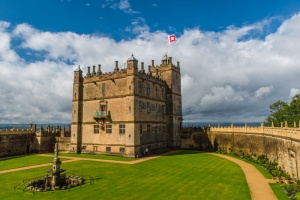
Bolsover Castle is an unlikely mix of early Norman stronghold, Jacobean manor, country house, and romantic folly. The Norman castle was erected by the Peveril family (see Peveril Castle).shortly after the Conquest, but today little remains of that structure. The third Peveril was exiled in 1155 and Bolsover was seized by the crown.
We do know that there was a stone keep here around 1173, surrounded by a curtain wall. Parts of the curtain wall are incorporated in the "Wall Walk" in the castle gardens.
In 1553 the castle was purchased from the crown by Sir George Talbot, later to become Earl of Shrewsbury. Talbot was later given the onerous post of gaoler to Mary, Queen of Scots, a duty which seriously dented his family finances. To ease the burden of debt, Bolsover was first leased, then sold, to Sir Charles Cavendish in 1612.
The buildings we see today are largely the work of two men, Sir Charles and his son William, first Duke of Devonshire. In 1612 Sir Charles began what is now The Little Castle, a mock medieval keep. Cavendish built in a romantic style, consistent with his fanciful ideals of chivalry.
He employed Robert Smythson (see Hardwick Hall) to create from the Norman castle a mansion of turrets and towers in a grand mock-medieval style. Despite its imposing appearance, The Little Keep was designed with comfort, not defence, in mind; it provided luxurious living quarters, by the standards of the day, for Sir Charles and his retinue.
Sir Charles died in 1616 and it was left to his son William to finish the original keep. Following Robert Smythson's death his son John took over the work, and it was he who added the Terrace Range.
This latter provided an imposing suite of state rooms and living quarters, with an expanded kitchen area. It was hastily remodelled to include a long gallery when a royal visit loomed. Charles I and Queen Henrietta Maria visited in 1634, and a specially written masque was performed in their honour.
Duke William was an avid horseman, widely regarded as one of the foremost horse trainers of his day. To indulge this passion he built the Stable Range, which featured a large training area for horses. A balcony looks down over the training area, affording visitors a chance to watch the equine training sessions.
Visitors today can climb to the balcony, which affords a closeup view of the magnificent timber roof (see photos). A Discovery Centre in the Stable complex allows visitors to learn about the world of Bolsover and its makers.
Site plan of Bolsover Castle (not to scale).

Parking
Free Parking available at the top of Castle Street.
About Bolsover
Address: Castle Street,
Bolsover,
Derbyshire,
England, S44 6PR
Attraction Type: Castle
Location: 6 miles E of Chesterfield on the A632. English Heritage parking outside the castle.
Website: Bolsover
English Heritage - see also: English Heritage memberships (official website)
Location
map
OS: SK471 707
Photo Credit: David Ross and Britain Express
HERITAGE
 We've 'tagged' this attraction information to help you find related historic attractions and learn more about major time periods mentioned.
We've 'tagged' this attraction information to help you find related historic attractions and learn more about major time periods mentioned.
Find other attractions tagged with:
NEARBY HISTORIC ATTRACTIONS
Heritage Rated from 1- 5 (low to exceptional) on historic interest
Bolsover Cundy House - 0.1 miles (Historic Building) ![]()
Sutton Scarsdale Hall - 2.2 miles (Historic House) ![]()
Hardwick Hall - 3.6 miles (Historic House) ![]()
Creswell Crags Caves - 4.3 miles (Prehistoric Site) ![]()
Stainsby Mill - 4.4 miles (Historic Building) ![]()
Hardwick Old Hall - 4.5 miles (Historic Building) ![]()
Chesterfield, Crooked Spire Church - 5.3 miles (Historic Church) ![]()
Renishaw Hall - 5.4 miles (Garden) ![]()











